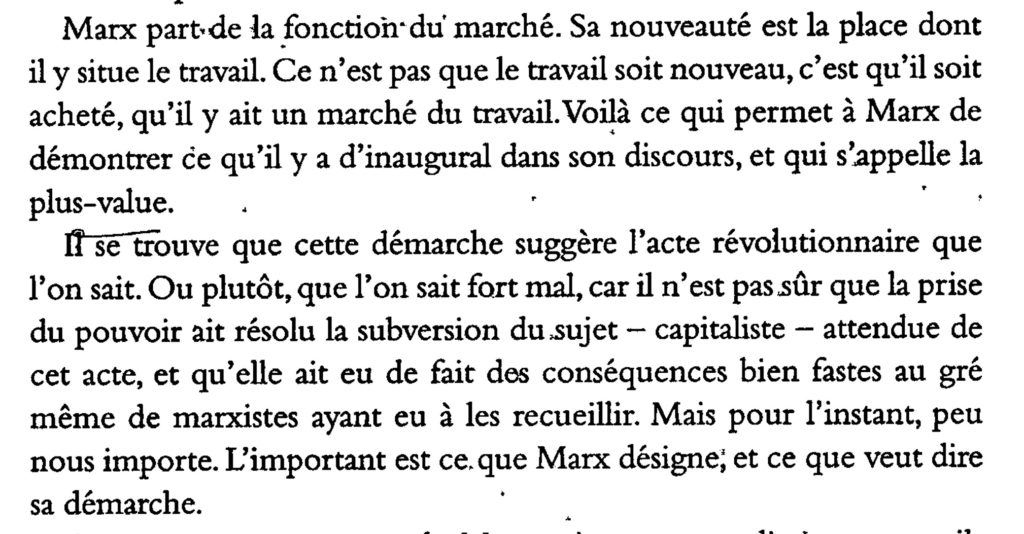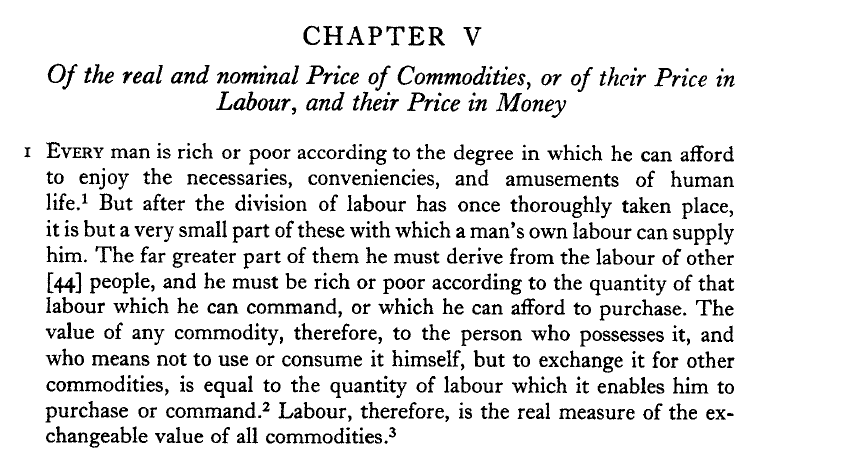“Marx departs from the function of the market. His novelty is the place where he situates labour. It is not that labour is something new but that it is bought, that there is a market of labour. This is what allows Marx to demonstrate what is inaugural in his discourse and what is called surplus-value.”
— The Capitalist Unconscious: Marx and Lacan by Samo Tomsic
https://a.co/epSlC3V
Tomšič is quoting from Lacan’s Livre XVI, D’un autre à l’autre:

No. In fact this is not new. Nor would anyone — anyone — familiar with classical economic thought mistake it for new. Here, for example, is Adam Smith, Book I, Chapter 5 — the very first paragraph:

Moreover, Smith will proceed in Chapter 8 to show how capital appropriates the surplus-value of labor: “As soon as land becomes private property,” writes Smith, “the landlord demands a share of almost all the produce which the labourer can raise, or collect from it. His rent makes deduction from the produce of the labour which is employed upon land” (I.viii.6).
Marx’s novelty has nothing whatsoever to do with surplus-value or the labor theory of value. Marx’s novelty is to show how social relations under capitalism are mediated by an abstract social form, the value form, that constitutes an historically novel, abstract, logical, subjectively and objectively compelling form of domination.
This should be of interest to Tomšič, since, far better than Lacan, it reinforces his claim that the subject, meaning the human subject, is not autonomous; rather is the abstract value form of the commodity.

As a Lacanian analyst I appreciate that you take the trouble to read Lacan — however decontextualized. And I very much liked your blog clarifying neo-liberalism as evolving historical practice and not just a misguided rationalization.
What Lacan gathered from his reading of Marx was a hypothetical correspondence between surplus value and “surplus jouissance” — in fact he defines jouissance itself as a kind of surplus value of libido or desire — the surplus of pleasure and pain that Freud had theorized humans are driven by (hence our unique potential for perversion as a libidinal strategy of seeking excess over and above pleasure and pain and reproductive sexuality). He even thought he could formalize this surplus of sexuality and aggression (which Freud ominously named “death drive”) in an algebra (just as Marx tried to formalize it in an application of differential calculus). Eventually he did position it in his theory of discourse — or “social link” — in which social-political behavior is driven by excess and surplus, not classical or even Hegelian rationality. He believed the surplus drives the “change of discourse” from capitalist mastery to the generalized slavery of communism.
In a neo-evolutionary theory we might attribute that “master-slave complex” to a perversion or pathology of our evolved instincts of domination and egalitarian resistance to domination (cf. Boehm, Moral Origins)